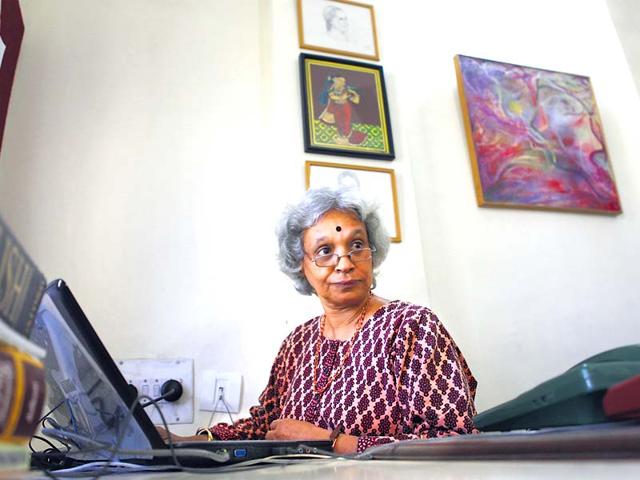Devoting her days to running Mumbai's only dedicated archive on women
If it were not for Dr CS Lakshmi's determined and consistent efforts in the face of all odds, Mumbai would not have had its first and only dedicated archive on women, their work and their lives.
Dr CS Lakshmi is a quiet presence, both in the unique organisation she heads and in the hustle-and-bustle of Mumbai. Yet, if it were not for her determined and consistent efforts in the face of all odds, the city would not have had its first and only dedicated archive on women, their work and their lives.

Unassuming to a fault, Lakshmi, 70, re-directs curiosity about her to the archive that has become synonymous with her, the Sound and Picture Archives for Research on Women (SPARROW). Unfairly, she says.
“SPARROW has been possible because of the efforts put in by many people, including my team of 15 years.” In its 25 years of cliff-edge existence, SPARROW has done it all -- amassed an enviable multi-media collection of documentation on women, painstakingly compiled oral and visual histories of a range of women, brought out beautiful works that commercial publishers would not touch, organised workshops around simple and exotic themes on women in arts and culture for schools and colleges, has been the nursery for researchers from international universities, brought out e-books and in between all this moved addresses across Mumbai.
Lakshmi is a part of the triumvirate – the others being the late activist Dr Neera Desai and feminist scholar Dr Maithreyi Krishna Raj – which set up SPARROW as a logical extension of the many discussions they had on women’s studies. Vina Mazumdar, secretary of the first committee on the status of women in India had brought out the first report in the mid-70s.
Fierce debates on feminism, women’s place, writing and work led to the inevitable realisation: there was a serious lack of documentation about women, their lives and work. If writing was available, the contexts such as journals, personal diaries and news clippings to understand it better were non-existent.
The very act of archiving women’s lives and work, and recalling it to inform contemporary projects became a feminist intervention for Lakshmi. She declined to make the archives a part of the SNDT University. At various points in its existence, the archive functioned out of Lakshmi’s home in suburban Mumbai, a garage, rented flats and so on before settling down in Dahisar in 2008 in a space appropriately called “The Nest”.
“We strongly believe that recording, reviewing, recollecting and reflecting on women’s history and life and communicating this knowledge in various ways is an important developmental activity. Positive change is possible only with knowledge and awareness of women’s lives, history and struggles for self-respect and human dignity,” Lakshmi explains.
Lakshmi is also Ambai, her nom de plume, the renowned Tamil writer whose characters are doughty women, and coming to terms with one’s body and use of space recurring themes.
She was the only Tamil writer to be included in the Picador Book of Modern Indian Literature. Her work has been widely translated into English. One part of her work enriches the other. And, when she takes SPARROW archival material to colleges during workshops, her distinctive and distilled understanding is passed on. Lakshmi is planning an exceptional museum in the city: A museum of women’s history and history of women.
It will offer a range of multi-media, multi-disciplinary and multi-cultural work – from stories of individual real-life heroines to the work of women scientists and traditional healers; the lives of women on the margins of society such as Dalit women; women in cinema, theatre and music, women on film posters and in songs and literature through decades. Funding this is among her major concerns.
Archiving and documentation is not glamorous work or work with outcomes. The value of an archive is best understood in a United Nations Universal Declaration on Archives in 2010 which stated that among other things, archives “play key role in administrative transparency, and democratic accountability, as well as the preservation of collective social memory”.
And, yes, an archive is still a relevant aspect of our online and immediate knowledge experience. “A physical archive is important to touch books, to see a handwritten document and to read a book with patience,” she says, scoffing at some young people who seek knowledge on demand in minutes. “SPARROW has been a journey, a struggle, a joy,” says Lakshmi.



